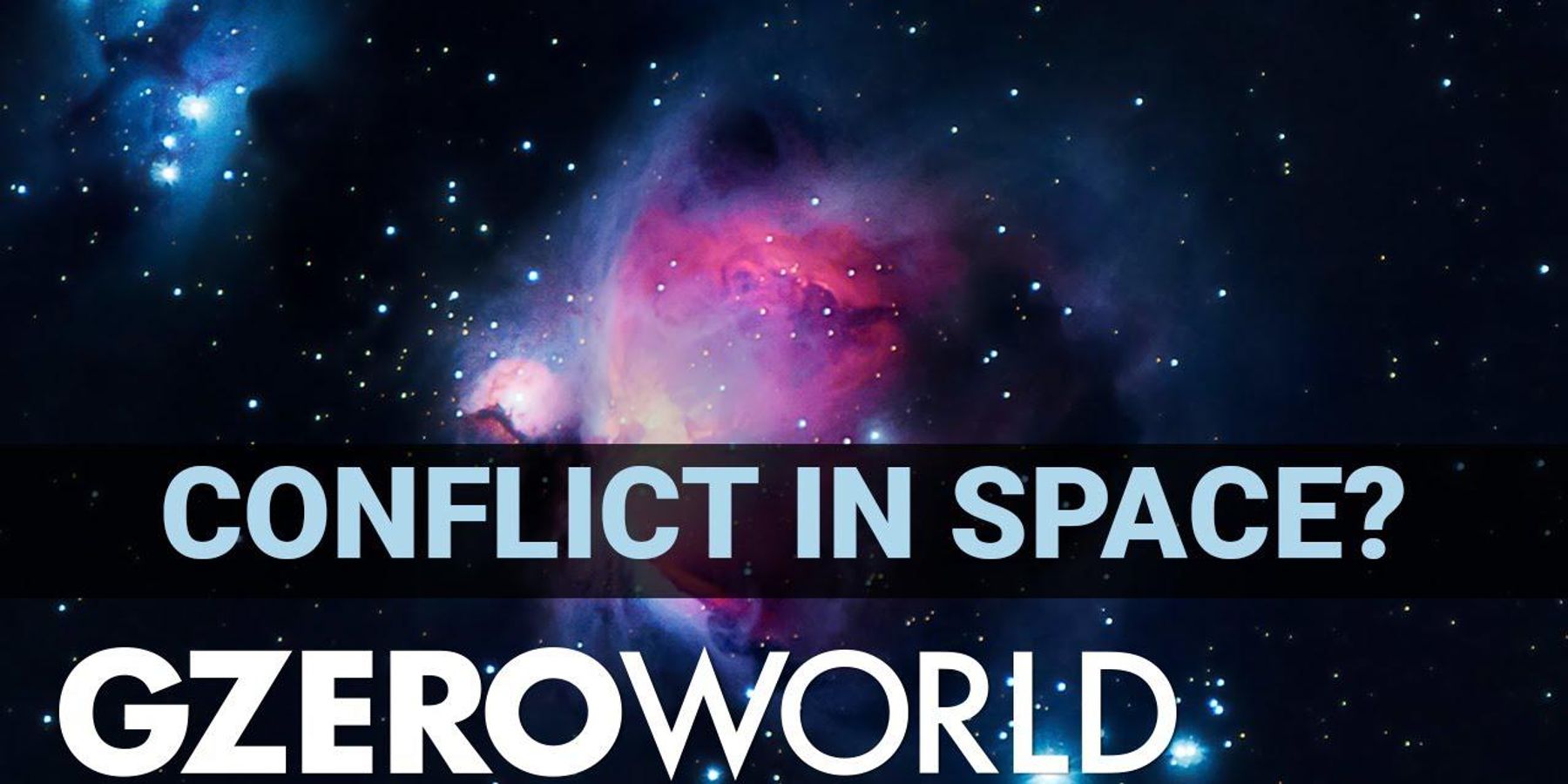Trending Now
We have updated our Privacy Policy and Terms of Use for Eurasia Group and its affiliates, including GZERO Media, to clarify the types of data we collect, how we collect it, how we use data and with whom we share data. By using our website you consent to our Terms and Conditions and Privacy Policy, including the transfer of your personal data to the United States from your country of residence, and our use of cookies described in our Cookie Policy.
{{ subpage.title }}
War in space? Time to update space law
The UN wants to prevent an arms race in space. How? By reforming international space law, which hasn't been updated in more than 50 years.
The current treaty was negotiated during the Cold War, when only two countries — the US and the Soviet Union — had viable programs. Ratified by 111 countries, it bans space nukes and grants all countries the right to peacefully explore space — including the Moon.
The 1967 Outer Space Treaty also says countries can’t claim sovereignty over celestial bodies. But that was before private space exploration by the likes of Richard Branson or Jeff Bezos.
The UN thinks it's time to update the law with more concrete rules and norms not only to prevent conflict, but also to regulate things like future mining on the Moon.
Watch this episode of GZERO World with Ian Bremmer: Will Putin invade Ukraine?
- What We're Watching: Musk irks China, Abbas meets Gantz in Israel ... ›
- Big Tech's big challenge to the global order - GZERO Media ›
- The Graphic Truth: Space junk — enter the trashosphere - GZERO ... ›
- Amazon satellites and Project Kuiper: next steps in Big Tech space ... ›
- Finland joins NATO in face off against Russia - GZERO Media ›
- Ian Explains: Who's winning the US-China space race? - GZERO Media ›
- The new space race: Sen. Mark Kelly on China's bold ambitions, America's policy & Russian threat - GZERO Media ›
- UFOs must be investigated, says former astronaut Sen. Mark Kelly - GZERO Media ›
Jeff Bezos' Blue Origin space flight & the new space race
Ian Bremmer shares his perspective on global politics this week with a look to outer space, in a special edition of (Out of The) World In 60 Seconds:
Was today's Blue Origin space flight a big deal for humankind, or just a big deal for Jeff Bezos?
I'm not sure the space flight itself was such a big deal for humankind, but I do think the advances in space technology, which are increasingly stepping up, they're much quicker. I mean, reusable rockets that land exactly where they took off. That's very different from the space shuttle a couple of decades ago, and very exciting in terms of the ability to not just engage in space tourism, but explore both what's outside of our Earth and beyond. So yeah, I think the fact that's being driven by the private sector is a big deal for the United States, a big deal for the planet. I, having said that, the planet that we're right now all on, is the one that matters, I think, the most to everybody for the foreseeable future.
Did Richard Branson steal Jeff Bezos' thunder?
No, I don't think he did. I think more relevantly, Richard Branson saved his company, Virgin Galactic. They had a problem. One of their planes or rockets, if you will, had malfunctioned. There were huge delays, and now suddenly they showed right before Bezos. They got an enormous amount of media attention. Branson's always been a genius at that. I'm much happier that he decided to apply himself to outer-space travel or near-space travel and tourism rather than trying to run for political office, frankly. It's better aligned towards that, and I think it will get more attention to space. Frankly, as someone who always loved space stuff and dinosaurs, when I was a kid, I think that's a good thing.
Will this flight have geopolitical implications like the 20th-century Space Race?
Sort of in the sense that in the United States, NASA has long been seriously underfunded. A lot of scuttled missions, not a lot of grand vision and ambition like we used to in the days of the Apollo missions. The Chinese, the Indians, the Emiratis are doing a lot more of that than NASA is, but the United States is still, in many ways, way out in front of the space race because of Jeff Bezos, because of Elon Musk. In fact, I'd argue that it's the guy that's not in the headlines this week or last week that matters most for space. That's Elon. He's kind of dominating near-Earth orbit. The truly interesting thing about Elon Musk though, and this is geopolitical, is that SpaceX is really an arm of the American military. It's like over 90% of all of their contracts are with NASA and the Pentagon, while Tesla is doing enormous business with high tech in China, with Chinese partners. And the ability for Elon to engage in that geopolitical balancing act. It is probably the most problematic business model out there of all of the advanced tech players. I'm not sure it's sustainable and I'm not sure which one he's going to choose. So we'll see where that goes.
